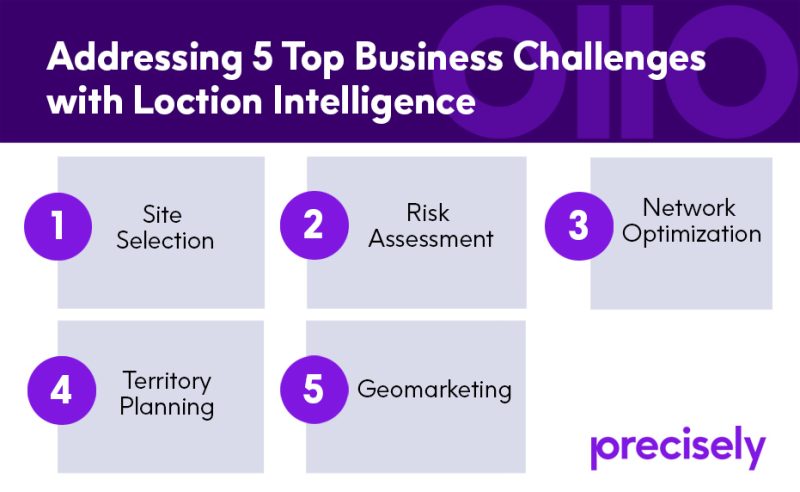
Location Intelligence Use Cases: Solving 5 Top Business Challenges

Key Takeaways:
- Harness the power of location intelligence to drive smarter, data-driven decisions that turn spatial data into a strategic asset.
- Top location intelligence use cases include efficient territory planning and network optimization, which help maximize productivity and customer satisfaction.
- Successful location intelligence initiatives require a foundation of high-quality address data, enrichment data, and spatial analytics.

Data is booming, but one critical piece often remains overlooked: the power of location.
Understanding the “where” of your data helps you unlock its strategic potential. Location intelligence use cases are nearly endless and aren’t just about mapping. By understanding spatial relationships, you gain previously out-of-reach insights, helping to drive informed decision-making across all levels of your organization.
Let’s look at five examples of business challenges that can be tackled with the help of location intelligence.
Addressing 5 Top Business Challenges with Location Intelligence
1. Site Selection
Whether you’re in retail, banking, or beyond, deciding where to open a new site can make or break your success.
Location intelligence transforms site selection from a gamble into a science – powerful enough for a single site – and scales tremendously when leveraged across multiple locations. By analyzing demographic and geographic data, you can pinpoint the optimal location for new stores, ensuring they meet customer needs and increase satisfaction.
Smart, innovative companies have turned site selection into a repeatable, data-driven process that can be refined and improved by adding even more layers of location-based data. That process is improving profitability, reducing risk, and helping business leaders identify new opportunities.
2. Risk Assessment
Understanding physical landscapes is crucial for pinpoint-accurate risk assessment. If you’re an insurer, leveraging the power of spatial analytics and data enrichment delivers a big-picture view of the factors that influence your policy decisions – including natural risk, elevation, and proximity to coastlines.
With the detailed insights that location intelligence provides, your business can make better data-driven decisions to effectively tailor your strategies and mitigate risks.
Read eBook
Top 5 Business Challenges Solved with Location Intelligence
Read this eBook and learn more about the 5 business challenges that are solved with location intelligence to make sense of spatial relationships for decision making.
3. Network Optimization
Location intelligence has various valuable use cases in telecommunications. High-quality location data is vital for planning and optimizing networks, especially with the rollout of 5G technology and the accuracy requirements that come with those wavelength frequencies.
Location intelligence and data enrichment help to identify the best sites for cell towers and route data traffic efficiently. In addition to optimizing capacity and service, location-based data informs stronger marketing campaigns targeting the appropriate addresses with eligible services.
While each telecom’s goals will vary, a common thread is an increasingly heavy reliance on spatial analysis for more efficient and effective decision-making.
4. Territory Planning
Effective territory management ensures that sales and service teams are where they must be to serve customers best and maximize efficiency. But you’ll likely fall behind if you continue relying on complex customer relationship management (CRM) systems to define territories.
Location intelligence provides dynamic tools for route planning and territory assignments, so you can:
- optimize field travel
- quickly adapt to staff changes
- empower your team to spend more time selling and delivering services
5. Geomarketing
Personalized experiences are essential to higher customer satisfaction. It’s about reaching the right person with the right message at the right time. This is what geomarketing is all about – and it’s a use case where location intelligence can help you multiply your results tremendously.
By using spatial analytics to understand where customers live and shop (and how often), you can refine and build more robust campaigns that ensure higher returns on your marketing spend.

Mapping Your Path to Location-Powered Success
With all these possibilities in mind and more data available to us than ever, it’s clear that location intelligence initiatives should be on the priority list for businesses across industries.
But for these ventures to be successful, you first need a foundation of high-quality address data, enrichment data, and spatial analytics. Together, these elements provide the critical location-based context you need to make faster, more informed decisions that keep you ahead of the competition.
To dive deeper into how these location intelligence use cases can transform your business, read the eBook: Top 5 Business Challenges Solved with Location Intelligence.


